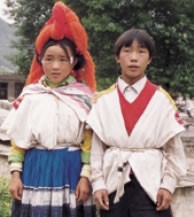The Gha-Mu are widely known as the Small Flowery Miao in Chinese and mission literature. The Small Flowery Miao (Gha-Mu) are not the same people group, nor do they speak the same language, as the Big Flowery Miao (A-Hmao) of Guizhou and Yunnan. The names were given to these groups by the Chinese last century. They do not use the word flowery in their autonym, which is Gha-Mu, and which may be a cognate for the name Hmong used by many Western Miao tribes and peoples. The Gha-Mu have small, complex geometrical shapes embroidered on their clothing around the shoulders and waist.
In the past, bandits raided remote Gha-Mu villages in Nayong County. The Gha-Mu had no weapons with which to defend themselves, so they used sticks. Today, to remember their bravery, Gha-Mu maidens perform a Painted Stick Dance during their festivals.
The Gha-Mu observe the Tiaohuapo Festival each March. "For the marriageable young of both sexes... it is one of their main chances to find a possible spouse. The young men decorate themselves with hats with long pheasant feathers."
There are many flood legends among the Gha-Mu. They believe that when the Thunder god threatened to destroy the earth with a deluge, a man called A-Zie "hollowed out a large gourd for himself, collected a hundred kinds and a thousand sorts of seeds, and put them in a smaller gourd." They believe that from A-Zie came all the peoples of the earth, including the many different branches of today's Miao nationality.
The Gha-Mu call the spirit world bi-lao, a general term "including gods, specters, ghosts, elves, demons and any other supernatural media. While some bilao are kind and act as bodyguards, most are evil and compared to thieves. These malevolent bi-lao are indifferent to human feelings and are continually seeking ways to cause harm to people." Today the great majority of the Gha-Mu are reported to have converted to Christianity.
The Gha-Mu people need reliable modern medicine in their community.
Despite severe persecution in the 1960s and 1970s, the Gha-Mu believers today are a vibrant and effective Christian community. Pray they will be a key missionary sending base for all of China.
Pray for the Holy Spirit to move mightily among Gha-Mu Christian believers, giving them true holiness and an example for all to follow.
Scripture Prayers for the Gha-Mu in China.
Operation China, Asia Harvest, Copyrighted © Used with permission
| Profile Source: Joshua Project |










